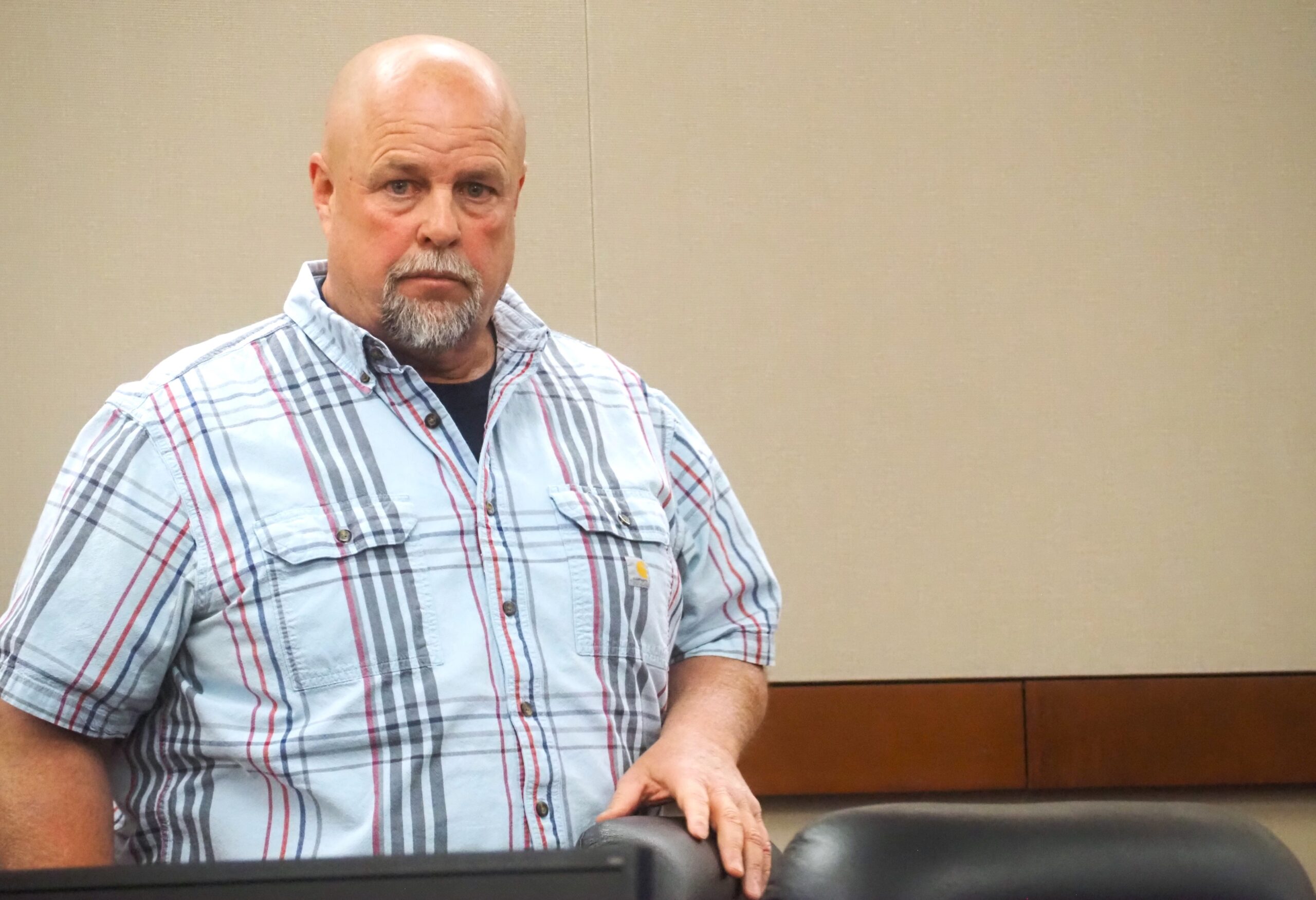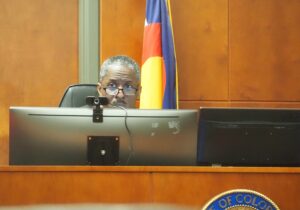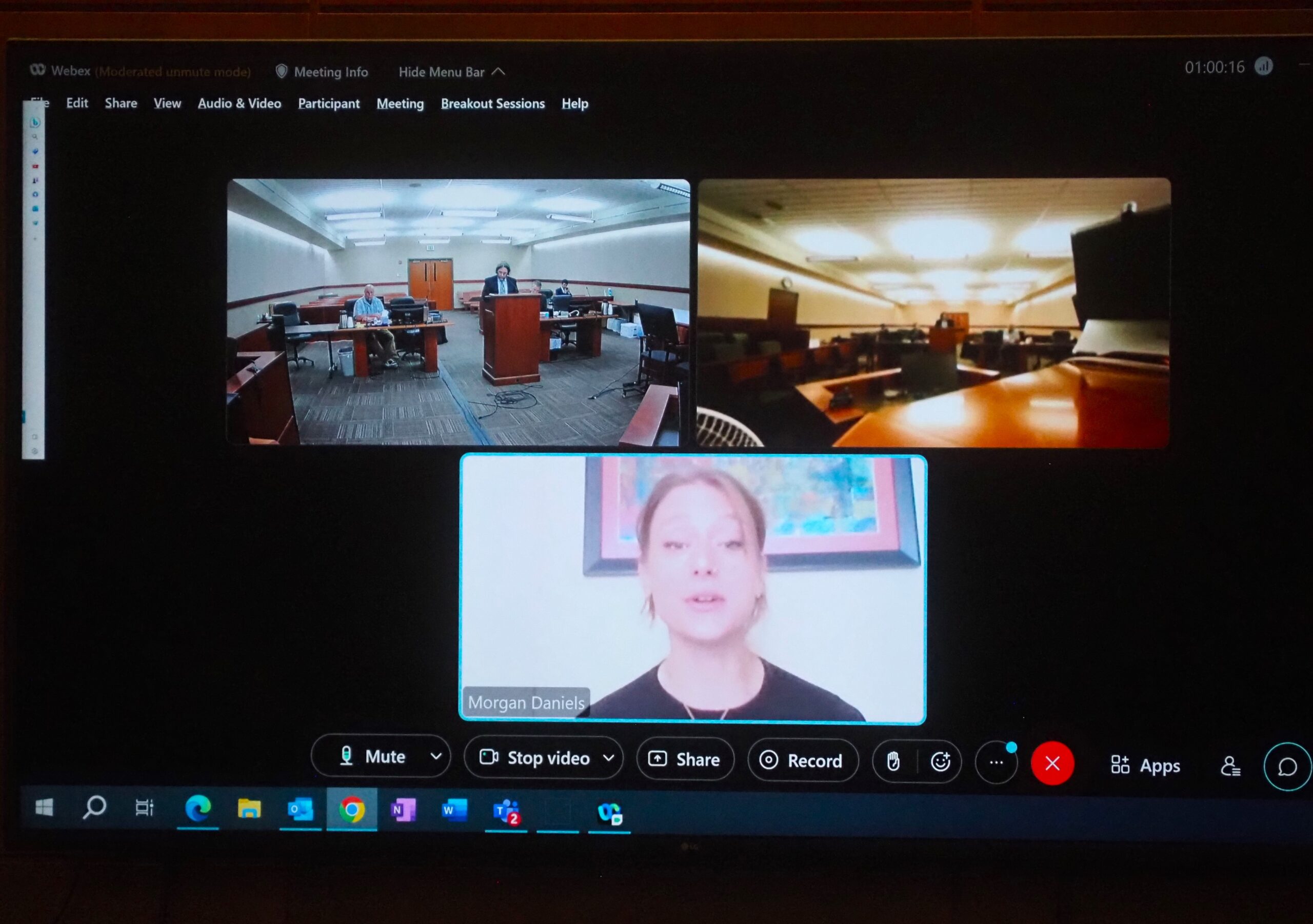
Holy Ground Tiny Homes founder Matt Sowash looks on during a civil trial in Arapahoe County District Court on Monday, April 22, 2024. (Justin Wingerter/BusinessDen)
A tiny home construction company that took $6 million from 180 customers who never received a house “is a ruse” designed to benefit its founder, a judge in Centennial said.
In an April 25 verdict, Arapahoe District Court Judge Don Toussaint ruled that Matt Sowash, owner of Holy Ground Tiny Homes in Englewood, stole $24,000 from one of those customers. Toussaint ordered Sowash to pay the victim about $84,000 and cover her legal fees.
“Holy Ground, or at least its purported purpose in manufacturing tiny homes, is a ruse,” the judge wrote, calling Sowash’s testimony under oath “befuddling” and “peculiar.”
“Holy Ground is not operated as a distinct business entity, but rather functions as an alter ego for (Sowash),” Toussaint said. “The Court finds that Holy Ground’s purchase of vehicles and its Las Vegas ‘benefit’ to 18 individuals were (Sowash)’s personal affairs.”

Arapahoe County District Court Judge Don Toussaint listens to testimony in his courtroom on Monday, April 22, 2024. (Justin Wingerter/BusinessDen)
The judge’s verdict came three days after a brief trial April 22 in the case of Morgan Daniels, a North Carolina woman who placed a 100% down payment of $35,250 for a tiny home in 2021. After repeated delays, Daniels demanded a refund the following year but was given just $11,000. So, she sued Sowash, accusing him of stealing the other $24,250.
Sowash and Daniels largely agree on what happened, so last week’s trial hinged on whether Sowash could be held personally liable for the actions of his company. Sowash’s attorney, Brian DeBauche, argued that because Sowash was not taking a salary at the time, he did not personally benefit and therefore could not be liable. But Toussaint disagreed.
“Defendant’s claim that he never used the money or got compensation from July 2022 through October 2022 is also not credible,” the judge wrote of Sowash.
“Defendant’s submission that he presently lives in a garage and earns $500 a week is unconvincing,” Toussaint added elsewhere in the ruling. “To allow Defendant to shirk his responsibility and avoid paying Plaintiff the remainder of her deposit is not equitable.”
The judge was particularly perturbed by Sowash’s decision to spend customer deposits on the Nevada trip. His nine-page decision mentions Las Vegas on five occasions.
“Defendant readily admits to making the decision not to pay plaintiff the remaining $24,248 after July 18, 2022,” Toussaint wrote. “Instead, Holy Ground treated its employees to a $20,000 trip to Las Vegas while its customers’ tiny home orders remained unfilled.”
When asked about the verdict Thursday, Sowash’s lawyer DeBauche emailed, “No comment.”
Daniels said in an interview Friday that she is thrilled about the verdict, which she sees as justice, and believes that it can give other Holy Ground customers some hope.

Morgan Daniels, at bottom, testifies virtually during the civil trial of Matt Sowash on Monday, April 22, 2024. (Justin Wingerter/BusinessDen)
“This has been someone’s worst nightmare and I know it has been other people’s worst nightmare too. So, I am really thankful that we stuck with it and things are finally going to happen,” she said. “The right thing was done in this situation, I think.”
Daniels was represented by Paul Grant of the law firm Goodreid Grant & Walta in Littleton.
“Ms. Daniels is the only (Holy Ground) customer who had the fortitude to see this through and I’m happy that I am representing her and that she had the wherewithal to take this all the way to trial, because she’s the only one so far,” Grant said by phone last week.
“I hope also that people see this and continue to take Mr. Sowash to task,” he said.
